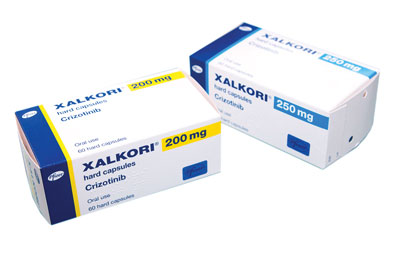Keytruda (pembrolizumab) vs Xalkori (crizotinib)
Keytruda (pembrolizumab) vs Xalkori (crizotinib)
Keytruda (pembrolizumab) is an immune checkpoint inhibitor that works by blocking the PD-1 pathway, thereby enhancing the body's immune response against cancer cells, and is commonly used for a variety of cancers including melanoma, lung cancer, and head and neck cancers. Xalkori (crizotinib), on the other hand, is a targeted therapy that inhibits anaplastic lymphoma kinase (ALK) and ROS1 receptors, making it specifically effective for non-small cell lung cancer (NSCLC) patients who have these genetic mutations. When deciding between Keytruda and Xalkori, it is crucial to consider the specific type of cancer, its genetic makeup, and the patient's overall health, as Keytruda is more broadly applicable for different cancers, while Xalkori is tailored for cancers with specific mutations.
Difference between Keytruda and Xalkori
| Metric | Keytruda (pembrolizumab) | Xalkori (crizotinib) |
|---|---|---|
| Generic name | Pembrolizumab | Crizotinib |
| Indications | Various types of cancers including melanoma, lung cancer, head and neck cancer, Hodgkin lymphoma, and others | Non-small cell lung cancer (NSCLC), ROS1-positive NSCLC, and ALK-positive metastatic NSCLC |
| Mechanism of action | Programmed death receptor-1 (PD-1) blocking antibody | Anaplastic lymphoma kinase (ALK) and ROS1 tyrosine kinase inhibitor |
| Brand names | Keytruda | Xalkori |
| Administrative route | Intravenous infusion | Oral |
| Side effects | Fatigue, musculoskeletal pain, decreased appetite, pruritus, diarrhea, nausea, rash, fever, cough, dyspnea, constipation, pain in extremity, and headache | Visual disorders, gastrointestinal effects, edema, elevated transaminases, fatigue, decreased appetite, upper respiratory infection, dizziness, and neuropathy |
| Contraindications | None known beyond hypersensitivity to pembrolizumab or its excipients | Hepatic impairment or severe renal impairment, concomitant use with strong CYP3A inhibitors or inducers |
| Drug class | Anti-PD-1 monoclonal antibody | Small molecule tyrosine kinase inhibitor |
| Manufacturer | Merck & Co. | Pfizer |
Efficacy
Keytruda (Pembrolizumab) Efficacy in Lung Cancer
Keytruda, also known by its generic name pembrolizumab, is a highly effective treatment option for certain types of lung cancer. It is a type of immunotherapy that works by blocking the PD-1 pathway, which some cancer cells use to hide from the immune system. By inhibiting this pathway, Keytruda helps the immune system to detect and fight cancer cells. It has shown significant efficacy in treating non-small cell lung cancer (NSCLC), particularly in patients whose tumors express PD-L1 and who have not had prior chemotherapy, or have received previous treatments but have progressed.
In clinical trials, Keytruda has demonstrated an improvement in overall survival compared to chemotherapy alone. For instance, the KEYNOTE-024 study showed that pembrolizumab provided a median overall survival of 30 months compared to 14.2 months with chemotherapy in untreated metastatic NSCLC patients with high PD-L1 expression. In addition, Keytruda has been shown to have a durable response, meaning that the effects of the treatment last for a significant amount of time after the therapy has been administered.
Xalkori (Crizotinib) Efficacy in Lung Cancer
Xalkori, with the generic name crizotinib, is another targeted therapy that has shown efficacy in the treatment of lung cancer, specifically in patients with advanced NSCLC that is anaplastic lymphoma kinase (ALK) positive. Crizotinib targets and inhibits the activity of the ALK protein, which can drive the growth of cancer cells. By doing so, Xalkori can help to shrink or slow the growth of tumors.
Clinical trials have demonstrated that crizotinib is effective in improving progression-free survival in patients with ALK-positive NSCLC. The PROFILE 1014 study, for example, showed that crizotinib nearly doubled progression-free survival compared to standard chemotherapy (10.9 months vs. 7.0 months). Furthermore, the response rate to crizotinib was significantly higher than that seen with chemotherapy. Xalkori has become a standard of care for patients with ALK-positive NSCLC, offering a targeted approach that can lead to better outcomes for this specific genetic subset of lung cancer.
Regulatory Agency Approvals
Keytruda
-
European Medical Agency (EMA), European Union

-
Food and Drug Administration (FDA), USA

-
Health Canada

-
Therapeutic Goods Administration (TGA), Australia

-
Medsafe (NZ)

Xalkori
-
European Medical Agency (EMA), European Union

-
Food and Drug Administration (FDA), USA

-
Health Canada

-
Pharmaceuticals and Medical Devices Agency (PMDA), Japan

-
Therapeutic Goods Administration (TGA), Australia

Access Keytruda or Xalkori today
If Keytruda or Xalkori are not approved or available in your country (e.g. due to supply issues), you can access them via Everyone.org.
How it works

Make an enquiry
Choose the medicine you want to buy, answer a couple of questions, and upload your prescription to speed things up. We’ll get back to you within 24 hours.


Make an enquiry
Choose the medicine you want to buy, answer a couple of questions, and upload your prescription to speed things up. We’ll get back to you within 24 hours.


Breeze through the paperwork
We'll guide you through the required documents for importing unapproved medicine, ensuring you have all the necessary information.


Get a personalized quote
We’ll prepare a quote for you, including medicine costs and any shipping, administrative, or import fees that may apply.


Receive your medicine
Accept the quote and we’ll handle the rest - sourcing and safely delivering your medicine.

Some text on this page has been automatically generated. Speak to your physician before you start a new treatment or medication.
Let's talk
If you have any questions, call us or send us a message through WhatsApp or email:
Contact us




